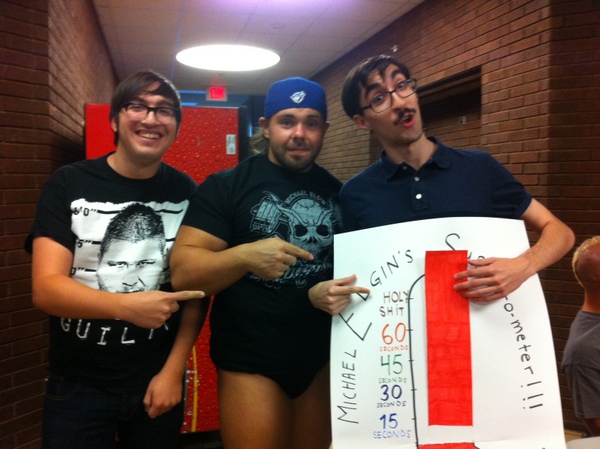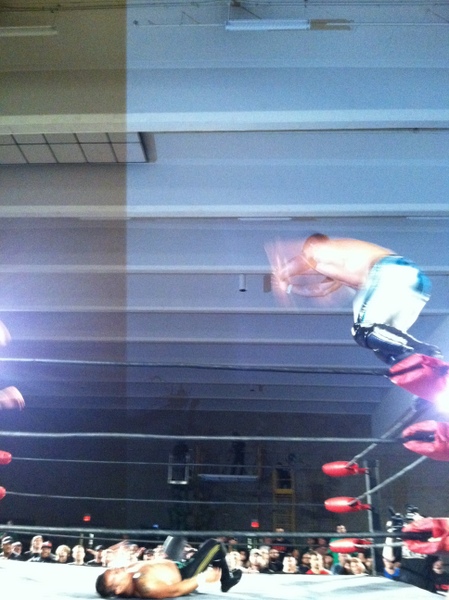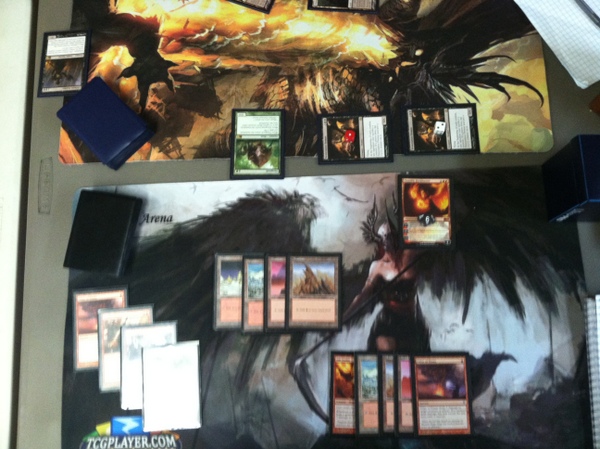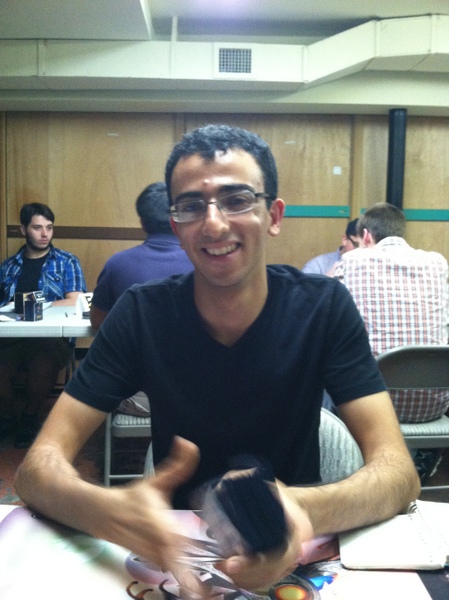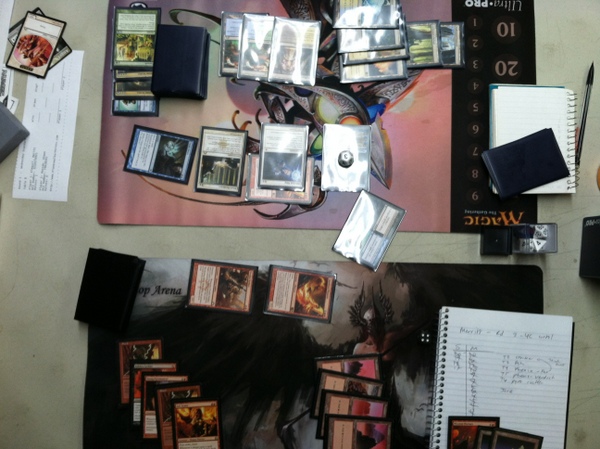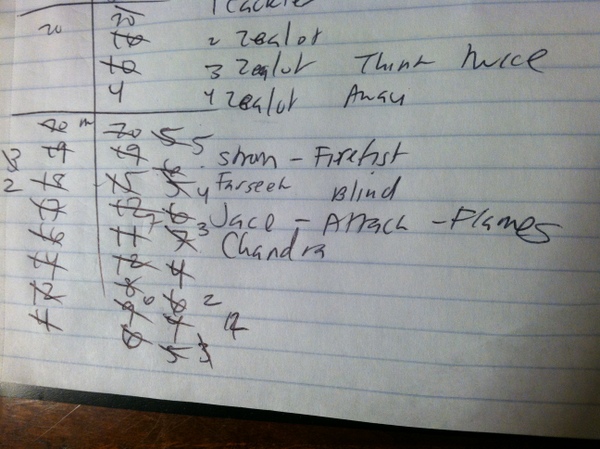I played four matches of Magic this week. My record was 1-2-1 with Red Deck Wins at Wednesday Night Standard. I didn’t play any games of Theros Standard nor did I attend the prerelease. Instead of staying up all night, flicking cards in a basement, and sleepily forgetting triggers, I drove down to Philadelphia to see a pro-wrestling event in an armory on the outskirts of town. This weekend I traded in my sleeves and playmat for homemade posterboard signs and a Kevin Steen T-Shirt. I traded “good luck”, “any responses?”, and “how many cards in hand?”, for chants of, “R-O-H”, “That was awesome!”, and my personal favorite, “you fucked up!”. While I hate missing any Magic event, especially one where it was marginally acceptable to wear a toga, I am happy with my decision to trade-in Magic for wrestling, if only for this weekend.
If anyone wants to know what a Suplex-O-Meter is, I can explain it to you.
While I could write an article series about the in’s and out’s of pro-wrestling, my weekly article about playing Magic the Gathering is obviously not the place to do it. Unless of course, I can draw an parallel between them in a way that makes some insightful commentary on playing Magic. To my knowledge, no one has attempted to link the two before, but after spending the six-hour drive from Philadelphia to Boston outlining my general argument to my brother and girlfriend, held hostage in the moving car, I came to one important realization:
The process is more important than the outcome
There are some very obvious differences between Magic the Gathering and pro-wrestling: in wrestling it is socially acceptable to suplex your opponent, you only need to count to three and not 20, and the referees forgo the slimming black outfits of DCI judges for vertical black and white stripes. The most glaring difference between the two though, is not the physical nature of one and the mental nature of the other, but rather the fact that in wrestling the matches are planned. I know this isn’t a bombshell for any readers over ten years of age, we all know wrestling is fake, but this nonetheless has interesting implications for a sport with winners and losers. While winning a match is preferable to a professional wrestler, it is somewhat beside the point, since the winner of the match is not necessarily the better wrestler, the wins and losses just serve to further the storyline. So the question then is how does this relate to Magic, when wins are determined both by skill and variance and not by the pens of writers in the back?
I would argue that in both Magic and wrestling, the process of the match is more important than the result. For most Magic players, the people who play casually at the kitchen table or at mostly smaller level tournaments, winning is certainly preferable but not why we play the game. For example, would you rather win a game where your opponent mulled to four or lose a tight game where both players are actively involved? I think of every EDH game I lost where I still managed to do something cool, losing didn’t make me feel bad because there is enjoyment in the process of playing. I was hanging out with friends, playing a game we mutually love, and found a way to express myself through gameplay. While drafting, my favorite part has always been picking the cards and deckbuilding. If I won the draft it certainly enhanced my experience, but regardless of the outcome, my enjoyment was derived from the process of drafting; reading and sending signals, taking the best card for the deck, and prioritizing curve considerations.
This past weekend I saw a near perfect match between two bigger names in the indy wrestling circuit; Davey Richards and Ricky Marvin. While both are known for their technical abilities and aptitude in the ring, they are stylistically very different wrestlers. Richards is a bit more conventional in his technique, employing a lot of convincing strikes and impressive submission maneuvers, whereas Marvin was trained in the Luchadore style and spends a lot more time jumping off the ropes for high-flying spots. Regardless of the discrepancy in styles, both guys played to each others strengths and “sold” each other’s moves (made the moves look real). Both guys maintained really good pacing for the match and managed to keep everyone interested during the entirety of the twenty minutes they were wrestling . At one point, Marvin did a moonsault (backflip) from the top rope onto Richards who was standing outside the ring. From ten feet in the air, Marvin put his own safety in the hands of Richards who had to catch Marvin, while simultaneous make it look like he hadn’t. After the move connected, everyone in the hall erupted and started stomping their feet and banging on the barrier outside the ring, chanting “That was awesome!” Marvin ended up losing the match, but to be honest, it didn’t really matter since he had put on such a good show.
In the end, the process is what is important. For me, good games are not defined by wins and losses but rather by the level of interaction and the depth of decision making. If my opponent is able to bluff me into making a bad attack and I fall for it, well that is awesome. Not only did my opponent next level me, which takes considerable skill, but I am better off for it because I can learn from the experience. I always want to win, and I try to play in a way that reflects that, but at the end of the day, Magic is my hobby. I feel privileged to be at a point in my life where I can invest considerable time and resources in something that I like to do whether or not it grants me money or recognition in the long run. Just being able to sit down and enjoy a game as complex as Magic with other people who also enjoy it is, well, it’s pretty fucking cool.
It’s good news that my philosophy of playing Magic isn’t entirely focused on wins and losses because I lost a lot of games this week at Wednesday Night Magic. I once again played Red Deck Wins, a deck I would recommend for post rotation standard but not one that really fits my play style. Here is the decklist I played for reference:
Red Deck Wins
Creatures (24)
4 Ash Zealot
4 Chandra’s Phoenix
4 Firefist Striker
4 Rakdos Cackler
4 Stromkirk Noble
4 Young Pyromancer
Spells (16)
2 Chandra, Pyromaster
2 Flames of the Firebrand
1 Mizzium Mortars
4 Pillar of Flame
4 Searing Spear
3 ShockLands (20)
18 Mountain
2 Mutavault
Sideboard: (15)
2 Burning Earth
2 Electrickery
3 Mark of Mutiny
1 Mutavault
4 Skullcrack
3 Thunderbolt
Round 1—Andrew with BG Rock (1-2)
I was hoping for some retribution against Andrew after he dismantled me a few weeks ago when I was playing Bant Auras, but it was not to be. It turns out that the Rock’s bevy of removal is not only good against Invisible Stalkers full of Rancor but also against vampire nobles, teenage pyromancers, and a certain planeswalker’s personal pet.
Game one, I was on the draw with a three-land four-spell hand. I continually drew land after land while Andrew played Desecration Demon into Desecration Demon into Thragtusk. I did manage to stick a Chandra, Pyromaster during this demon onslaught but was too far behind to win with the +1 or get enough card advantage out of the -0.
Sideboard:
-4 Pillar of Flame
+2 Skullcrack
+2 Mark of Mutiny
Pillar of Flame seems pretty abysmal in this match-up since it only kills Lifebane Zombie, which I expected him to side out, and the occasional Scavenging Ooze. I’m not 100% sure bringing in Skullcrack here is correct, but it deals more damage than Pillar and potentially negates a big life swing from Thragtusk.
Game two, I had a much faster hand and curved out nicely with Stromkirk Noble, into Young Pyromancer, into Firefist Striker (while keeping Shock up). Though Andrew pressured me by playing a turn two Ratchet Bomb, the artifact was a bit slow in dealing with my creatures. I was able to get him to eight life before he detonated the bomb and from there it was easy to point three burn spells at his head to seal the game.
Game three, was something of an epic endeavor where the game came down to a Young Pyromancer elemental token racing a Lifebane Zombie. The little token that could dealt over 9 damage over the course of the game with both of us topdecking to try to finish the match. I ended up putting him to one before he stabilized with a Scavenging Ooze off the top. I looked down at my graveyard at the end of the match to see a Chandra’s Phoenix peeking out from the bottom that I could have recurred much earlier in the game to finish him off. Good beats.
Round 2—Ben with Aristocrats Act One (0-2)
Ben was just returning to the game after an 8-year hiatus and declined posing for a picture since he’s trying to stay off the grid.
Game one was a slobber-knocker. The 30-minute game came down to my Chandra being one turn away from ultimating. I had been using the first ability to kill a human token, deal one damage to him, and recur my Chandra’s Phoenix to block his giant Falkenrath Aristocrat in hopes that I could reach the -7 ability. He ended up drawing a crucial removal spell and killed the Chandra before it could do some real damage. On the following turn, Ben played another Falkenrath Aristocrat and that was lights out for me.
Sideboard:
-2 Firefist Striker
+2 Electrickery
Ben’s Aristocrat’s list had quite a few X/1 creatures including Blood Artist, the tokens from Gather the Townsfolk, the tokens from Lingering Souls, Champion of the Parish, Doomed Traveler, and of course, Falkenrath Aristocrat. Electrickery seems to be at a premium against this many one toughness dorks.
Game two, I was really proud of myself when I used Electrickery to kill a Champion of the Parish and two Gather the Townsfolk tokens with Champion’s ability on the stack. Unfortunately, that’s the coolest thing I did and I was defeated by an endless stream of aristocrats of both the cartel and Falkenrath variety.
At this point in the night, I wasn’t feeling great about the 0-2 start but was determined to play it out for the sake of the article and any dignity I had left.
Round 3—Merrit with 4C Control (1-1-1)
Merrit’s deck is basically a greedy pile of good cards in a bunch of different colors. Despite 4C control being a bit on the slow side, I certainly hadn’t expected to have any draws with Mono Red. I guess there is a first time for everything.
Game one, my perfect curve was interrupted by Far//Away, Supreme Verdict, and Jace, Architect of Thought. I managed to put him to five but couldn’t get past the Fleeting Distraction machine that is Jace.
Sideboard:
-4 Pillar of Flame
-1 Mizzium Mortars
+2 Burning Earth
+3 Skullcrack
Game two, I opened with Rakdos Cackler and then proceeded to play three Ash Zealots over the next three turns. This proved too fast for the Farseeking mage and we shuffled up for game three.
Game three, Blind Obedience did a lot of work. Here’s what my notes look like:
Round 4—Stephanie with BW Vampires (2-0)
Stephanie was a really nice casual player with a homebrew deck. I don’t have a picture of her because I guess she is a big deal in the cosplay community and doesn’t want her real name on the internet. This is the coolest reason anyone has ever turned down a photo for one of my articles.
The games we’re relatively quick, with me getting off to a quick start and spearing any Vampire Nighthawks she tried to throw in my way.
After the games, we talked a little bit about the reasons why people play Magic. Stephanie said that she enjoys building her own decks and wanted to play something she thought was flavorful and cool. In her case it was a Vampires deck complete with Liliana of the Veil Sleeves and deckbox. I was thinking about why I liked playing Magic, and realized it’s sort of like why I like watching wrestling…
Next week, I will be taking a short break from Standard and regaling you all with my experience playing Team Sealed at SCG Worcester.
At age 15, while standing in a record store with his high school bandmates, Shawn Massak made the uncool decision to spend the last of his money on a Seventh Edition starter deck (the one with foil Thorn Elemental). Since that fateful day 10 years ago, Shawn has decorated rooms of his apartment with MTG posters, cosplayed as Jace, the Mind Sculptor at PAX, and competes with LSV for the record of most lifetime Islands played. When he’s not playing Magic, Shawn works as a job coach for people with disabilities, plays guitar in an indie-pop band, and keeps a blog about pro wrestling.

